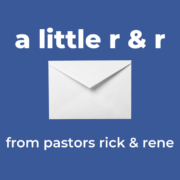a little r & r

Spanish-born, American philosopher George Santayana gifted us with the well-known remark, “Those who cannot remember the past are condemned to repeat it.” Mark Twain added,
“History doesn’t repeat itself, but it often rhymes.” History has a lot to teach us if we pay attention. The life of Christians and the church are often deeply affected.
Whether we prefer the idea of history repeating itself or rhyming, though, we are living in a not-altogether unprecedented crisis of 2 kinds; one: political, social and historical, the other: economic.
The first kind of crises have occurred approximately every 80 to 100 years throughout American history. Historians William Strauss and Neil Howe call these recurring crises “Fourth Turnings.” Fourth Turnings, often called “Winters,” are not inevitable acts of fate; but every time they occur, they instill much public apprehension and anxiety, not to mention division. They are always marked by either global or national unrest, and sometimes both: The last three Fourth Turnings in American history occurred with World War II 80 years ago, the Civil War 80 years before that, and the Revolutionary War 80 years before that.
But there is also good news with Fourth Turnings; viz., they are followed by much calmer First Turning Highs: 1950’s “Happy Days,” 1870’s Reconstruction, and 1790’s Constitutional Founding of the United States. Good things can happen during Fourth Turnings best exemplified in the end of Fascism in Europe and Asia and Lincoln’s Emancipation Proclamation. Bad things can happen during First Turnings: Carpetbaggers in the South after the Civil War and the extension of Jim Crow practices after WWII. All Turnings wear a Janis Face.
Fourth Turnings, last approximately 18-22 years. The present 4th Turning probably began between the time of Hurricane Katrina in 2005 and the Great Recession in 2008. The present 4th Turning will likely conclude in the second half of this decade, if not sooner.
Along with these 80 to 100-year cycles ending in 4th Turnings, the United States also undergoes a major economic crisis approximately every 50 years. The last major economic shift occurred in 1980 with President Reagan’s repudiation of the New Deal. The New Deal began during the presidency of Franklin Delano Roosevelt following the Wall Street Crash of 1929. The “Roaring ‘20’s” actually looked similar to today’s economy: with high rolling financial speculation that led to the Crash, low taxation and low regulation. This was the Gilded Era.
Fifty years before the Crash in 1873 the United States suffered a terrible depression. For a while the First Christian Church René and I served in Omaha, obviously much later, closed temporarily while the nation’s economy tanked. Around that same time in the 1870’s grasshoppers literally ate Nebraska and were so numerous they could darken a brilliant blue sky and blot out the sun. Plagues and pandemics come in many forms.
These economic shifts—often with political implications—swing between Keynesian economic theory of high taxation and high government regulation (the New Deal and Jacksonian populism in the 1820’s) and folks called Monetarists like Nobel Prize winner, Milton Friedman who affirmed low taxes on the nation’s wealthiest (“trickle-down economics”) and low government regulation. President Reagan instituted Friedman’s theories. But just as Keynesian economics faltered in the 1970’s in the overwhelming defeat of George McGovern, trickle-down economics is flagging here in the early 2020’s. The trickle is too little to sustain the health of our society when today 1 out of every 7 Americans is going hungry and unemployment figures are the highest since the Great Depression.
What makes this period we’re living through especially trying, besides with the pandemic, is that we may well be experiencing a confluence of a Fourth Turning political, social, and religious (faith) crisis at the same time we are undergoing an economic crisis. No arena of human activity has gone unscathed. Normally during Fourth Turnings, conservative churches experience decline, as people begin to start questioning their religious assumptions, which they may have mindlessly taken for granted but went unchallenged before hard times came along.
The likelihood is we will soon witness a major political realignment along with a similar shift in economic thinking. Fourth Turnings combined with every-50th-year economic shifts like we are in, perhaps for the first time in American history may have temporary unsettling consequences, which are not altogether predictable. The likelihood is that, if previous economic shifts are any indication, the United States could be watching another 50-year shift toward higher taxes and more government regulations than in the immediate past 50 years when the reverse was true. Politically, socially, and historically Fourth Turnings usually come with a major political realignment. Current events in the aftermath of the insurrection at the Capitol Building suggest that political styles, values, and even organization are in deep flux.
I think we can assert Twain and Santayana are both right. We can also assert that cycles and pendulums in human events are normal not exceptional. Fourth Turning Crises are dangerous Winters. First Turning Highs are glorious Springs.
But we Christians do not limit our perspectives on current events and history to a humorist or a philosopher or to nature’s rhythms. We take our cue from the preacher Koheleth in the Book of Ecclesiastes, Chapter 3, who implies life cycles and regular swings from one extreme to another are normative in nature.
There’s a season for everything
and a time for every matter under the heavens:
a time for giving birth and a time for dying,
a time for planting and a time for uprooting what was planted,
a time for tearing down and a time for building up,
a time for crying and a time for laughing,
a time for mourning and a time for dancing,
a time for embracing and a time for avoiding embraces,
a time for searching and a time for losing,
a time for keeping and a time for throwing away,
a time for tearing and a time for repairing,
a time for keeping silent and a time for speaking,
a time for loving and a time for hating,
a time for war and a time for peace.
God has made everything fitting for its time.
A few weeks ago, I told a story about “This too shall pass.” (I won’t repeat it here. Go to the Facebook tape for January 10th to listen it.) But this Fourth Turning and this economic extremity will also pass, along with the pandemic. Given more time, we will see better times ahead.
My hope is we are all learning something new and wonderful about what God wants for us through this hard time. My hope is we will all have rediscovered how deeply God loves us. Because, as the prophet Jeremiah reports from God at a time of disaster for Israel, “I know the plans I have in mind for you, declares the Lord, they are plans for peace, not disaster, to give you a future filled with hope.”
Hope on, friends! Hope on!
P.S. If you have questions or want to comment or dialogue about what you’ve read here, I’m always open to discussion. Contact me at 402-301-3279 or rpmcycler@gmail.com.


